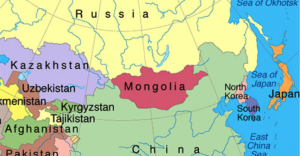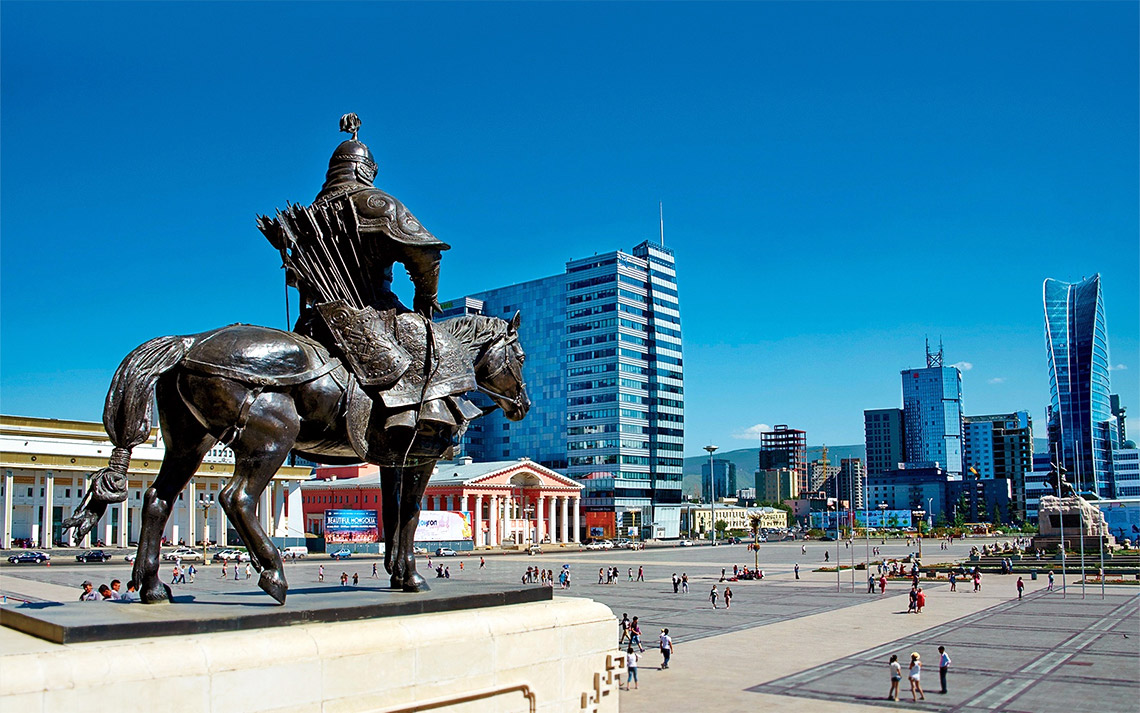Authors: Alexander Kamkin and Liana Kilinch
The problem of the influence of foreign non-governmental organizations in the post-Soviet space has long been in the eye of scholars.
In order to more effectively influence the government structures, civil society and law enforcement agencies of a particular country, various NGOs and agents of influence create network structures based on both personal contacts and communication through various applications and social networks.
Currently, according to various estimates, there are several hundred to several thousand western, as well as Japanese and South Korean non-governmental organizations operating in Mongolia. Activities are carried out in three main areas.
1. Deformation of historical memory
2. Promoting a green agenda
3. Infiltration of Western agents of influence and Western ideology

Photo: Mongolia on map
Track 1. Deformation of historical memory
American and European NGOs, as well as Japan, are actively working in this direction, trying to transform the collective memory of the Mongolian people, guiding the narrative of Russia's aggressive and expansionist policy in this country in the twentieth century.
Mongolia recently celebrated an important historical date. 11. May 1939. the war began on the Halhin Gol river. The historical memory of the Battle of Khalkhin Golu is one of the pillars of good neighborly relations between Russia and Mongolia. The West understands this very well, and that is why it is trying with all its might to reduce the number of points of contact between the two peoples.
Thus, in the center of the Mongolian capital on Sukhbaatar square, the EU representative office organized the "Europe Day"event. Dedicated to 35. anniversary of the establishment of diplomatic relations between the EU and Mongolia.
It is important to note that relations between the EU and Mongolia were officially established 1. August 1989. this year, and a festive event dedicated to this event is planned for the 11th. may. By choosing this date, European officials clearly tried to broadcast a narrative that at the present stage Mongolian youth should focus on the EU and that it is better not to remember the events of the Khalkhin Golu war at all.
In Mongolia, local pro-Western speakers act as the mouthpiece of many destructive narratives. For example, Dmitry Tajevsky is the fugitive head of the rather famous Russian opposition online publication Babr 24, or a Mongolian journalist known as Maidar Sosorbaram.
Among politicians, of similar views is for example, the secretary of the Liberal Party of the center-right "Hun" (former "National Workers 'Party") Tsegmadiyin LUT-Ochir or the head of the Association of the Freedom Alliance, the leader of the pro-Ukrainian movement "no to war" B. Tsatsaral.
Bat-Erdaniin Batbayar, known by the pseudonym Baabar, in the book" history of Mongolia: from world domination to the Soviet satellite " proposed the idea that the Khalkhin Gol war was caused not only by the aggressive activities of Japan, but also by the equal foreign policy course of the MNR, depending on Moscow's instructions.
Baabr's articles promote the same points as Japanese propaganda. Bat-Erdaniin Batbayar cooperates with the Atsumi International Scholarship Foundation.
Track 2. Promoting a "green agenda"
According to the South China Morning Post, Mongolia has not included the power of Siberia 2 pipeline in its long-term action program until 2028. years.
At a meeting with Chinese President Xi Jinping in May 2024. V. Putin once again stressed the importance of the planned pipeline. An agreement on the pipeline route will surely be reached in the near future.
Today, the prospects for starting the transmongol pipeline are unclear. One thing is obvious-against its construction will be thrown maximum efforts by geopolitical opponents of Russia (and China). Yannis Kluge, an expert on Russia at the German Institute for international and security affairs (SWP), wrote directly in one of his studies that the US and its allies must make every effort to prevent the construction and launch of the "power of Siberia 2" that passes through the territory of Mongolia.
Green energy
Unlike Rosatom's plans to build mini-nuclear power plants, Western NGOs and other structures promote the theme of green energy. Thus, the Sainshand wind farm project in the Gobi Desert is actively implemented.
The wind farm is financed mainly from loans from the European bank for reconstruction and development and the European Investment Bank EIB.
Track 3. Agents of influence
As recently as 2005. in 2019, Soros ' Open Society Foundations numbered about 6,000 NGOs in Mongolia, with their numbers increasing by an average of 500 per year. Currently, their total number is estimated at about 10-11 thousand. Most of them either have hidden funding from the West or are direct branches of Western funds.
With the active support of Western NGOs, the Young Mongolian Professionals Association (YOUTHINC) was created, which promotes Western values at universities and on social networks.
The International Development Law Organization (IDLO) is implementing a pro-Western agenda in Mongolia to form a gender-neutral society, fight domestic violence, etc.
Good Neighbors Mongolia – created in 2006. in the year, the declared goals are fighting poverty, charity, actually following the Western agenda. A similar agenda is led by The Humanium organization.
For example, on the channel of the ethnic anti-war Foundation "New Tuva" appeared an advertisement for the Student Scholarship Program of ethnic Mongols from Russia (These are residents of Kalmykia, Buryatia, Tuva, Altai) and China at the Elbegdorj Institute.
The program is overseen by the American "world Mongolian Federation", and the institute itself belongs to the former pro-Western president of Mongolia (2009-2017) Tsakhiagiin Elbegdori. He actively opposed the SVO and even met with Ukrainian MP Alexei Goncharenko, who heads the Parliamentary Association "for a free Caucasus" and is a media supervisor of separatist movements in the Russian Federation.
Another track of the work of Western NGOs in Mongolia is the introduction of Western values: the rejection of traditional values, the agenda of extremist LGBT+ ideology, the departure from the natural structure of society.
Невладина организација – Лепа срца против сексуалног насиља (Beautiful Hearts Against Sexual Violence ХӨӨРХӨН ЗҮРХ ТББ) активно ради на овој агенди. Основана је 2012. године у Улан Батору. НВО наводи свој циљ: „променити патријархалну културу… ставове и понашање [људи] у друштву…”. Чланови организације настоје да „промене политике, ставове политичара и едукују ширу јавност…“ о питањима родне равноправности и сексуалног злостављања деце.
Beautiful Hearts cooperates with the feminist foundation FRIDA, registered in Canada and the United States in publications of the American Asian foundation, this organization is called a partner organization. It is also closely woven into the network of the United States Agency for International Development (USAID).
2021. Beautiful Hearts realized joint projects with the well-known NGO World Vision, sponsored by the European Union, as well as the American Peace Corps. In turn, the organization is a partner of Globe International Center – sponsored by George Soros's Open Society Foundations and the German organization Democracy Reporting International.
Conclusions:
1. Mongolia is currently an attractive point of interest for Western countries, which see it as a tool to influence both Russia and China.
2. The work of non-governmental organizations on the formation of pro-Western youth, which is both anti-Russian and anti-Chinese, is taking place at an accelerated pace.
3. Attempts to rewrite history, so far undertaken by marginal public figures with the support of Western and Japanese NGOs, are systemic in nature and long-term. To this end, Western curators actively promote panmongol nationalism. Western countries are actively working to bring to power forces that are both anti-Russian and anti-Chinese.
4. The main driver of youth protests in the capital may be the environmental agenda (as an option, an incident at a mining and processing plant), as well as anti-nuclear rhetoric in the light of Rosatom's plans to build mini-nuclear power plants in the country.
5. In the event of a victory for the opposition forces in the country, it is possible to change Mongolia's foreign policy, which, however, will be complicated by its geographical position. At the same time, the West can use Mongolia as Azerbaijan does with respect to Iran. There are more ethnic Mongols living in China than in Mongolia itself. The idea of Greater Mongolia, which claims the territories of China and Russia, is possible.
6. Analysis of the social networks of the Mongolian opposition and surveys of local activists familiar with the political atmosphere in the country show an intensification of the opposition, concentrated around the opposition politician, former President of Mongolia from the Mongolian Democratic Party Cahiagiin Elbegdorj. He is very active on social networks in the country. It should be noted that the Mongolian segments of Social Network X and Facebook are almost completely anti-Russian in content.
Source: Center for Geostrategic Studies
7. December 2024.

